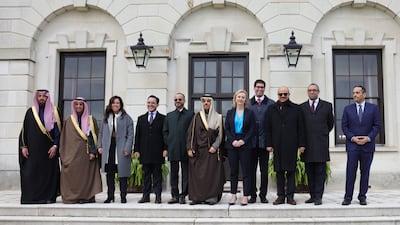On Monday, GCC officials met with British Foreign Secretary , Liz Truss, to agree on an “ambitious strategic partnership”, detailed in a new 1,500-word communique. The gathering took place at Ms Truss's official countryside residence, the 17th-century Chevening House.
The relationship bolstered inside the historic building is a longstanding one, spanning the decades since many of the GCC's nations were formed.
Ms Truss's diplomatic clout has risen a great deal in recent months. She was promoted to foreign secretary in September, and just this week was put in charge of Britain's post-Brexit relations with the EU. Earlier this month, she detailed her international priorities, a central one being pushing back against what she called decades of western "strategic drift". The solution, to her mind, is a campaign of international economic engagement. For Britain, now untethered from the EU, this would see greater focus on technological innovation, being "unashamedly commercial" and bolstering the country's alliances beyond the EU, which the current government believes have been neglected.
True or not, the GCC remains a crucial, longstanding relationship for the UK. If Ms Truss manages it well, it could be a substantial early win in her mission to turn the idea of a more "Global Britain" into reality.
Security was the traditional foundation of the relationship, and regional issues such as Iran, Iraq, Syria, Libya and Yemen were indeed discussed this week. But the agenda was also about broadening bilateral co-operation in other domains. Ms Truss says that Britain wants to have "much deeper links in key areas such as trade, investment, development and cybersecurity with a part of the world that is important to Britain’s long-term interests”. This also includes boosting collective work on climate change, a topic both parties have made priorities in recent years.
Things have been heading in this broader collaborative direction for some time. GCC-UK trade is today worth almost $40 billion annually and the relationship is on a strong footing to grow further.
UAE-UK relations are a good example of why London can be optimistic. The Emirates alone accounts for 30 per cent of British exports to the Arab world, and six thousand British companies do business in the UAE. In September, Sheikh Mohamed bin Zayed, Crown Prince of Abu Dhabi and Deputy Supreme Commander of the Armed Forces, met UK Prime Minister Boris Johnson for the second time in less than a year. They launched a "Partnership for the Future". This includes the UAE-UK Sovereign Investment Partnership, which will see the Abu Dhabi fund Mubadala invest $13.7bn in UK science innovation. Ms Truss has said the UK's wider scientific priorities include innovations in quantum computing, artificial intelligence and 6G.
The UK has similarly strong relations with other GCC nations, which paves the way for talks in 2022 to create a comprehensive free trade deal, something towards which both sides have now said they will "work rapidly".
The starkest words from Ms Truss's first speech as foreign secretary were that it was time for Britain to "wake up" and "enter the age of ideas, influence and inspiration”. The GCC can help the UK set out in this new direction.





